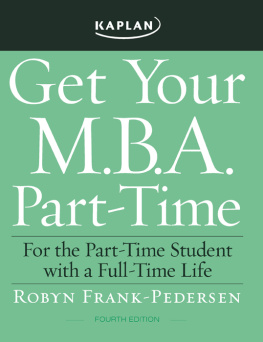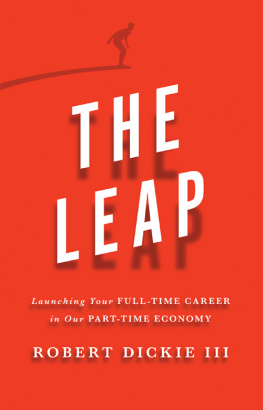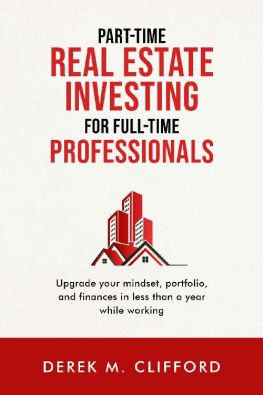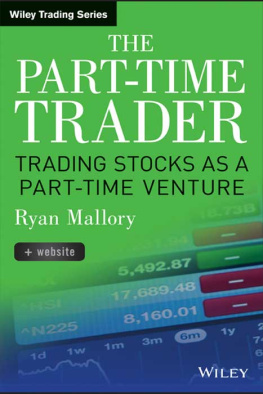Fourth Edition
Get Your M.B.A.
Part-Time:
For the Part-Time Student with a
Full-Time Life
Robyn Frank-Pedersen

Contents
When I was in college, I had no clue what I wanted to do with the rest of my life. In fact, for someone who grew up in the big city, I was surprisingly nave. One thing was certain; I knew that attending a good university would ensure at least a few open doors. Or so I thought. After all, isnt life like the movies? You work hard, obtain your degree, and magically land the perfect job complete with fame, fortune, and satisfaction, and everyone lives happily ever after, The End? Okay, so I was a little greenjust bear with me.
So there I was, graduating from Brandeis University, my whole life ahead of me, but unsure of where I was headed. Armed with a psychology degree, I was ready to... I had no clue! Back in New York City, I used my connections to land several jobs: assistant to the fashion editor at a womans magazine, travel agent, gofer at my fathers office. All in all, nothing particularly meaningful or permanent.
To my surprise, the degree that I thought would open so many doors essentially led me to: How many words per minute can you type? Using my language skills, I settled on the first administrative position that I was offered. Landing in a French commercial bank appeared arbitrary at first, but things started falling into place and I realized that I was beginning to find my niche.
Convincing people that I could type and actually doing it were two very separate things. In time I figured it out, but I seemed more adept with figures than words and was soon transferred to the accounting area. One thing led to another; one year flowed into the second and the third and the fifth. My direct supervisor at the time was pursuing her M.B.A. at night. When her husband was transferred to South America and she left the bank, I was alone, trying to fill her very large shoes. Maybe it was my family background (as the youngest of three girls, I was always trying to please and make things right) or my competitive nature (conquer the next obstacle), but I really needed, at that juncture, to prove myself. My bosses felt that I was not ready to take over the vice president position that was recently vacated. They did permit me, however, to do all the work and put in the hours that that position entailed. The lesson I learned was the following: my soft skills needed fine-tuning and I was not experienced enough to take on the management position of a vice president. Time would take care of the latter, but I needed something else to cure the former.
Many, many months of long hours and increasing responsibilities with small promotions and little salary increases led me to another decision. All the kudos and pats on my back at work were not going to get me that big promotion. What would guarantee it is that little square piece of paper called a diploma. My decision was made, and off I went to B-school. The decision of where to go was easy: I followed in the footsteps of my predecessor and attended Fordham University. Going at night would ensure that I would be next in line for the big promotion. The big joke was that in my situation, after taking two or three classes per trimester, I was still getting home earlier than I used to from the office! My office was footing the bill and I was a hero.
However, at 30 years old, I was unmarried, working late each night, going to school after work and spending my entire weekends in the stacks at the Fordham library. These were the few concessions I made, yet I never doubted my decisions. My one wish was that I had had a better idea of everything that I was getting intoa guide. Attending school while maintaining a full workload is an extremely challenging and ultimately rewarding endeavor. Being prepared for what lies ahead is a students best weapon, which is why I was determined to impart some insider info to future part-timers.

Having recently returned to Fordham University to talk with some administrators as part of the research for this book, I was so surprisedand impressedby the variety of programs now offered. Some were available almost 10 years ago when I started my M.B.A., unbeknownst to me, and I seriously regret not having involved or immersed myself further in the program. I did not do the one thing I advise all of you to do: adequate research. I followed in my boss footsteps and in the process did a disservice to myself. Had I investigated the various available programs, I may have benefited more from my degree and the M.B.A. experience in general. It was my mistake; dont let it be yours. (Since graduation, I have gone back to Fordham University and audited several courses for a very nominal feea wonderful benefit awarded to alumni.)
In the next chapters, I will share with you some of my experiences as well as suggestions from your peers, colleagues, employers and educators. I hope to share with you some of my insightsthings I wish someone had told me when I was going through the process.
Lets start off with my first piece advice: You can obtain only one M.B.A. Dont rush into itdo your homework carefully and select or create the program that is right for you.
Over the past few decades, the Master of Business Administrationotherwise known as the M.B.A.has become the most visible and popular of graduate degrees. With it comes a certain amount of clout and prestige that is unparalleled. More than 90,000 M.B.A. degrees are awarded annually in the United States alone, and the numbers of programs and graduates are proliferating all around the world. In both the business press and more popular media, the behavior and career prospects of M.B.A.s are repeatedly described, analyzed, and stereotyped. The global selection process for admission to the M.B.A. programs has developed a life of its own, producing hundreds of thousands of GMAT examinations every year, numerous guides and publications, a worldwide recruiting network of admissions forums, and sophisticated ranking systems designed to provide information to prospective consumers of M.B.A. education.
Yet all this media hype has also produced negative publicity. As far back as 1980, a cover story in Time, The Golden Ticket, described in unflattering terms what M.B.A.s have done to us. This theme continued throughout the decade of the 1980s, when soaring Wall Street salaries, greed, and M.B.A.s became synonymous. In the 90s, M.B.A.swith their command of quantitative financial analysis and the latest management theorieswere often held responsible for corporate downsizing, shifting of manufacturing overseas, and other scary aspects of 1990s capitalism. During the dot-com craze, many B-school candidates were lured to Internet companies, with their promise of fast fortunes and generous stock options, in lieu of the traditionaland more time-intensiveeducation route.
So what does this all mean for you, someone whos considering whether or not an M.B.A. is worth the time, effort, and money it will require?
Its necessary to cut through the marketing and media hype to understand a few things about the multifaceted, evolving phenomenon we call M.B.A. education. The fact is that the M.B.A. remains a very good investment for most business careers. For some careersfor example, investment banking or management consultingit is virtually a prerequisite. Business schools strive to meet the practical needs of business leaders, and it is certainly still the case that those who wish to attain the highest positions in the world of business would do well to get their M.B.A.s.
Next page








![Ryan Mallory [Ryan Mallory] - The Part-Time Trader: Trading Stock as a Part-Time Venture, + Website](/uploads/posts/book/124134/thumbs/ryan-mallory-ryan-mallory-the-part-time-trader.jpg)


